| Srl | Item |
| 1 |
ID:
130688
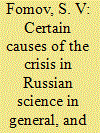

|
|
|
|
|
| Publication |
2014.
|
| Summary/Abstract |
The article focuses on the crisis in Russian Science, particularly Military Science. Topics presented include the crisis in military science as discussed by N.M. Vasilyev on his paper "On the Crisis in Military Science and Ways of Dealing with It," published by Military Thought journal, differences between military art and science, dialectics and materialism as scientific methodology.
|
|
|
|
|
|
|
|
|
|
|
|
|
|
|
|
| 2 |
ID:
125103
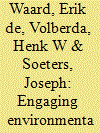

|
|
|
|
|
| Publication |
2013.
|
| Summary/Abstract |
Since the transformation was set in motion to change Western armed forces from large-scale mechanized defensive organizations into smaller agile expeditionary crisis response forces, the call for organizational flexibility has rocketed. Yet, actual research into the key organizational drivers of flexibility has hardly been done. To bridge this gap, the present study has analyzed to what extent modular organizing and organizational sensing have contributed to flexible military crisis response performance. The study uses the Netherlands' armed forces as a representative example of a contemporary Western crisis response organization and empirically draws upon its recent operational experiences. It has uncovered that within most mission contexts, modular organizing acts as a facilitator for the organizational sensing process. Yet, within highly turbulent crisis response missions, organizational sensing becomes the predominant driver, stimulating ad hoc solutions that challenge existing structures, available technology, and standard procedures.
|
|
|
|
|
|
|
|
|
|
|
|
|
|
|
|
| 3 |
ID:
135263
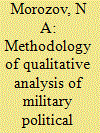

|
|
|
|
|
| Summary/Abstract |
The paper covers the general methodology points of qualitative analysis of military political systems underlying aggregate assessments of possibilities for resolving conflicts and making recommendations for the concepts of weapons (Forces) employment in strategic Operations. It also examines the main tasks of the methodology, and the areas and limits of its application.
|
|
|
|
|
|
|
|
|
|
|
|
|
|
|
|
| 4 |
ID:
130660
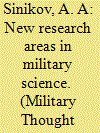

|
|
|
|
|
| Publication |
2014.
|
| Summary/Abstract |
The article examines trends in military science that use field categories borrowed from conflict and crisis studies. Topics discussed include the differentiation between military science as a field of study to military conflict studies, the inventory of theories included in military science, origins of the view that military conflict is more general than war. It cites trends in military conflicts that can serve as grounds for formulating scientific regularities in the course of research.
|
|
|
|
|
|
|
|
|
|
|
|
|
|
|
|
| 5 |
ID:
130023
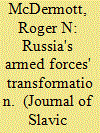

|
|
|
|
|
| Publication |
2014.
|
| Summary/Abstract |
Since the creation of the Armed Forces of the Russian Federation in 1992, the Kremlin has grappled, struggled or even procrastinated on addressing the question of what type of force structure may best suit the state's security environment. A number of initiatives frequently represented as 'reform' have come and gone, falling by the wayside due to internal inertia, institutional resistance to root and branch reform or, indeed, as a result of the political-military elite failing to come to terms with the disintegration of the Soviet Union. Transitioning from the Soviet legacy force to something more akin to the forces needed to protect the Russian state and adapt to the modern warfare environment to meet a number of differing challenges ranging from counterinsurgency to peacekeeping or dealing with an unforeseen military crisis plagued Moscow's defense planning.
|
|
|
|
|
|
|
|
|
|
|
|
|
|
|
|
| 6 |
ID:
163317
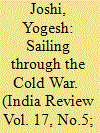

|
|
|
|
|
| Summary/Abstract |
It took approximately two decades for the Indian Navy to acquire submarines even when the first naval plan prepared by the Naval Headquarters in New Delhi and informally submitted to the British Admiralty in September 1947 contained an active submarine component. Other littoral navies in the Indian Ocean went for submarines much earlier. Using Indian, British, and U.S. archives, this article argues that the delay in India’s submarine arm was largely a result of the vagaries of the Cold War. Both Britain and the United States wanted the Indian Navy to contribute to the Western effort for a collective defense against the communist threat, which was largely conceived to be submarine based. This resulted in a surface heavy force structure. However, as India’s threat perceptions changed in 1960s, its quest for submarines gained momentum. When negotiations with the Western powers did not result in anything concrete, Indian Navy turned to the Soviets for initiating its own submarine arm. This decision had long-term implications for the Indian Navy as its underwater fleet thereafter remain dependent upon Soviet assistance for the rest of the Cold War.
|
|
|
|
|
|
|
|
|
|
|
|
|
|
|
|